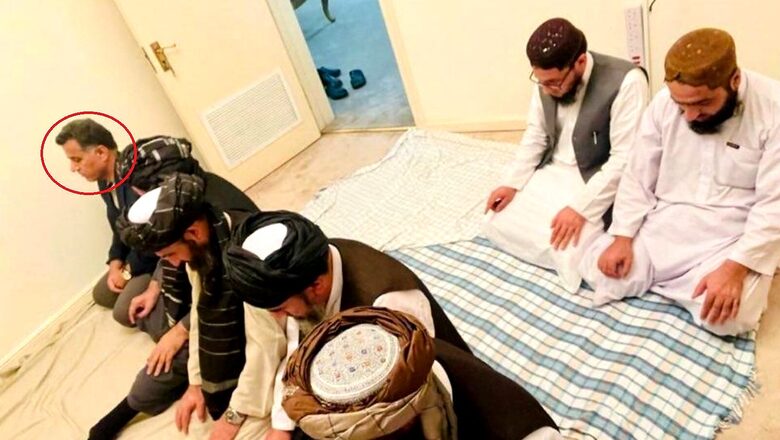
views
The Pakistan ISI’s heavy involvement in the deliberations between the Taliban and the Pakistan government has been confirmed. Exclusive photos accessed by CNN-News18 show ISI Chief Hameed Faiz meeting top Taliban leaders in Kandahar.
CNN-News18 had previously reported that Pakistan is set to play a major role in the formation of a new government in Kabul. Pakistan Foreign Minister Shah Mehmood Qureshi is expected to reach Kabul on Sunday for talks on the government formation.
Hameed Faiz, with Taliban leader Mullah Abdul Ghani Baradar and other leaders, was seen carrying out Namaz prayers in Kandahar, before Baradar’s departure to Kabul on Saturday.
ALSO READ: Pakistan to Play ‘Positive Role’ in Taliban Govt Formation, FM Qureshi May Visit Afghanistan on Sunday
Determined to Play ‘Positive’ Role: Pak
Mehmood Qureshi on Friday had said Pakistan is determined to play a “positive role” in Afghanistan as he appealed to the Taliban insurgents and former rulers of the war-ravaged country to formulate an all-inclusive political government after mutual consultations. Our envoy in Afghanistan is also in touch with different Afghan personalities, he had said in a statement.
The Taliban insurgents swept Kabul last week after the US-backed Afghan government collapsed and President Ashraf Ghani fled the country, bringing an unprecedented end to a two-decade campaign in which the US and its allies had tried to transform the war-ravaged nation.
The foreign minister had said the Afghan delegation visiting Pakistan held talks with him and Prime Minister Imran Khan. Qureshi had said some “anti-peace elements” were active to play the role of spoiler. He said it was the test of Afghan leadership’s sagacity as to how they coped with such challenges.
He had added that it was time for all neighbouring countries of Afghanistan to sit together for consultations. He had also announced that he would visit neighbouring countries in the next few days to chalk out a comprehensive strategy after consultations.
Afghan Delegation in Pak
About a week ago, several senior Afghan leaders had arrived in Pakistan for a conference on the future of their nation, with Afghan President Ashraf Ghani having fled the war-torn country. Pakistan Representative for Afghanistan, Ambassador Muhammad Sadiq, had said in a tweet that he received the Afghan delegation at Islamabad International Airport.
“Just received a high-level Afghan political leadership delegation,” he said, adding that Speaker Ulusi Jirga Mir Rehman Rehmani, former minister Salah-ud-din Rabbani, former vice president Mohammad Yunus Qanooni, senior leaders Ahmad Zia Massoud, Ahmad Wali Massoud, Abdul Latif Pedram, Khalid Noor, and Ustad Mohammad Mohaqiq were part of the delegation. “Matters of mutual interest will be discussed during the Afghan political leadership’s visit,” he had said.
The group consisted of leaders who were part of the different governments after the Taliban was toppled in 2001.
As they arrived, Pakistan’s Foreign Minister Shah Mehmood Qureshi had said at a press conference that Pakistan has no “favourites” in the conflict and it is on the same page with the international community to find a political solution to the problems.
“Pakistan agrees that there should be no military solution to the Afghan issue and wants all problems to be resolved through dialogue,” he had said.
He said Pakistan’s objective is to see the development and prosperity of Afghanistan. To a question about recognising the Taliban government, he said: “When the time comes, Pakistan will recognise the Taliban government in line with international consensus, ground realities, as well as Pakistan’s national interests.”
India’s Veiled Attack on Pak
External Affairs Minister S Jaishankar, in his address to the United Nations Security Council earlier, had spoken on the issue of Afghanistan’s takeover by the Taliban, and in a veiled criticism of Pakistan, said whether it was in Afghanistan or against India, groups like Lashkar-e-Toiba and Jaish-e-Mohammed continued to operate with both impunity and encouragement.
“In our immediate neighborhood, ISIL-Khorasan (ISIL-K) has become more energetic and is constantly seeking to expand its footprint. Events unfolding in Afghanistan have naturally enhanced global concerns about their implications for both regional and international security,” he had said.
Jaishankar added that the heightened activities of the proscribed Haqqani Network justified this “growing anxiety”.
Haqqani’s Rise: ‘An Arm of Pak Intelligence?’
Slated to be powerful players in the new regime following the Taliban’s takeover of Afghanistan last week, the Haqqanis have been blamed for some of the deadliest attacks in recent years, claiming the lives of civilians, government officials and foreign forces.
The shadowy group was formed by Jalaluddin Haqqani, who gained prominence in the 1980s as a hero of the anti-Soviet jihad. At the time, he was a valuable CIA asset as the United States and its allies such as Pakistan funnelled arms and money to the mujahideen.
During that conflict and following the Soviet withdrawal, Jalaluddin Haqqani fostered close ties with foreign jihadists — including Osama bin Laden. He later allied with the Taliban who took over Afghanistan in 1996, serving as a minister for the Islamist regime until it was toppled by US-led forces in 2001.
Jalaluddin Haqqani’s death after a long illness was announced by the Taliban in 2018, and his son Sirajuddin formally became the network’s chief. Thanks to their financial and military strength — and a reputation for ruthlessness — the Haqqani network is considered semi-autonomous while remaining within the Taliban fold.
Mainly based in eastern Afghanistan — with alleged bases across the border in Pakistan’s northwest — the group became more visible in the Taliban leadership in recent years, and Sirajuddin Haqqani was appointed deputy leader in 2015.
They have also long been suspected of links with the Pakistani military establishment — US Admiral Mike Mullen described them as a “veritable arm” of Islamabad’s intelligence in 2011. However, Pakistan denies the allegation.
Read all the Latest News, Breaking News and Assembly Elections Live Updates here.



















Comments
0 comment